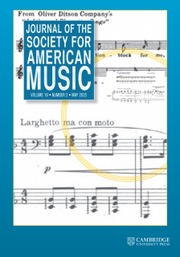No CrossRef data available.
Article contents
Inclusive Publics and Modern Technologies: An Introduction to Three Essays on Early Twentieth-Century American Opera
Published online by Cambridge University Press: 04 June 2019
Extract
The three essays brought together in this cluster are immersed in themes that characterize “Americanness” in the twentieth century. They provide a microcosm of critical issues that define opera in the United States during these first decades when the nation helped shape the creation of opera rather than principally being a site for importing European works. Although most of the composers discussed in these articles were born in Europe (Giacomo Puccini, Paul Hindemith, and Ernst Krenek) and only a few in the United States (Marc Blitzstein and George Antheil), all of them spent significant time in the United States, and all of the works discussed are either set in the United States, utilize American characters, or tied to important American themes.
- Type
- Research Article
- Information
- Copyright
- Copyright © The Society for American Music 2019
Footnotes
This cluster of articles originated as a session entitled “Opera, Media, and the Nation” held at the National Meeting of the Society for American Music in 2016 in Boston. As the assigned moderator of this panel I was impressed with how these three papers spoke so well to new ways of thinking about Americanness and opera in the United States during a critical and formative period. I am very honored to have worked with the three wonderful contributors, Kunio Hara, John Gabriel, and Danielle Ward-Griffin, and I thank them for their insightful scholarship, hard work, and warm collegiality in making this collaboration productive and enjoyable.


